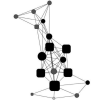RECERCAIXA
Strategies of survival of households in poverty: The role of formal and informal support networks
Description
The global financial crisis of 2008-2014 increased the number of households in situations of poverty in Catalonia (as in the rest of Spain) and the severity of their problems. Studies of poverty tend to focus on identifying temporal tendencies and the profiles of the most vulnerable segments, but they typically do not analyze how people manage to survive situations of poverty. However, this analysis is essential for designing and reinforcing policies that can strengthen the roles of different types of support. Although it is assumed that households rely on formal and informal systems of support, the context of the crisis has two features: first, government support programs had been considerably reduced, and second, informal support networks of the poor had suffered a notable depletion and may no longer give adequate support. Given these facts, we proposed, first, to carry out an in-depth analysis of the survival strategies actually used by households in poverty, i.e. to analyze the source of formal (state, public and private institutions, etc.) and informal aids and its variability over time. Our second goal was to analyze the interaction between formal and informal support (i.e., both the influence of informal networks on the access and use of formal systems as the way in which charitable and civic organizations help to strengthen informal networks). For these purposes, we used a mixed-methods design consisting of quantitative (social network analysis and secondary databases) and qualitative data (ethnographic techniques, case studies, and semi-structured and structured interviews) conducted by an interdisciplinary research team composed of academic researchers and key representatives of the third sector, particularly in the context of social exclusion and poverty. The project, funded by the RecerCaixa program of La Caixa, emphasized the transfer of results and applied research.
The Principal Investigators were Miranda Lubbers and Hugo Valenzuela (egolab-GRAFO).
Publications
-
CHOOSE, BUY, PAY - PARADOXES OF SHAME-RELIEVING PROCESSES AMONG IMPOVERISHED SPANIARDS AFTER 2008’S GREAT RECESSION (2022). Journal of Organizational Ethnography, 12 (1): 120-137. DOI
-
“SHE’S SURROUNDED BY LOVED ONES, BUT FEELING ALONE”: A RELATIONAL APPROACH TO LONELINESS (2021). Social Inclusion, 9 (4): 350-362. DOI / Open-access PDF
-
RELATIONSHIPS STRETCHED THIN: SOCIAL SUPPORT MOBILIZATION IN POVERTY (2020). Annals of the American Academy of Political and Social Science, 689 (1): 65-88. DOI / Open-access PDF
-
DO NETWORKS HELP PEOPLE TO MANAGE POVERTY? PERSPECTIVES FROM THE FIELD (2020). Annals of the American Academy of Political and Social Science, 689 (1): 7-25. DOI
-
CHARITIES AS SYMBOLIC FAMILIES: ETHNOGRAPHIC EVIDENCE FROM SPAIN (2019). Journal of Organizational Ethnography, 8 (1): 25-41. DOI
-
CHARITIES UNDER AUSTERITY: ETHNOGRAPHIES OF POVERTY AND MARGINALITY IN WESTERN NON-PROFIT AND CHARITY ASSOCIATIONS (2019). Journal of Organizational Ethnography, 8 (1): 2-10. DOI / Open-access PDF






